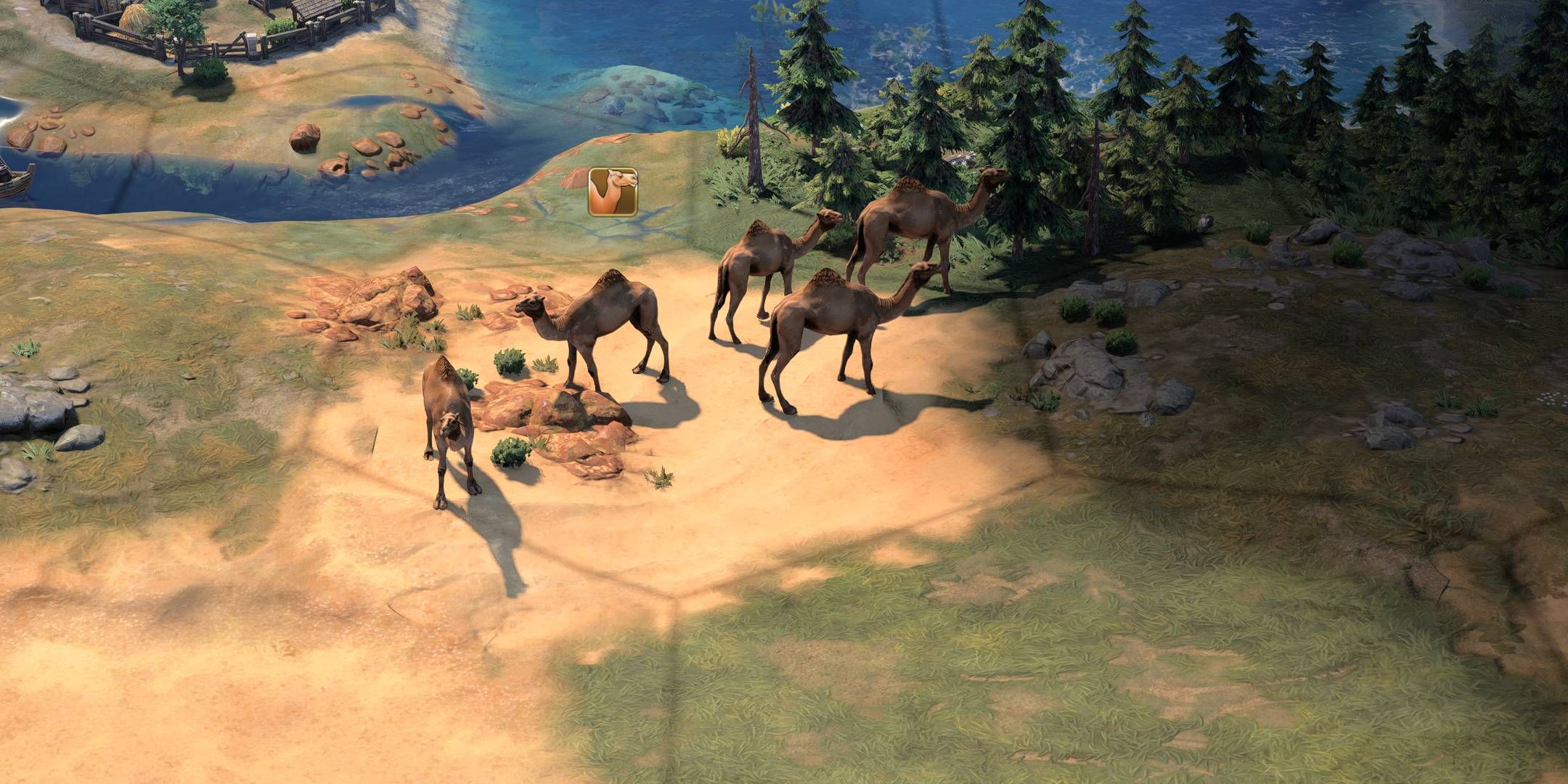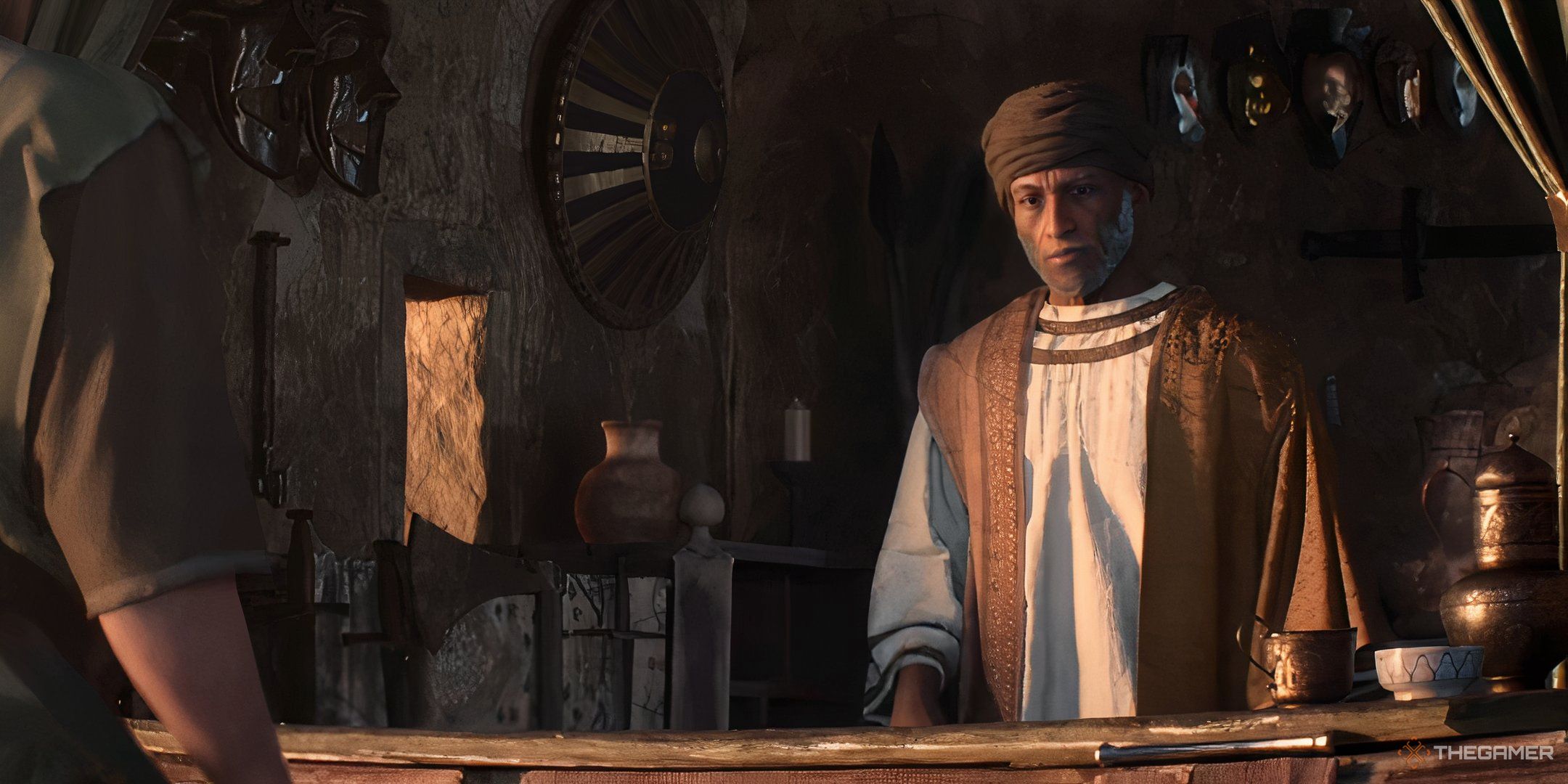Carthage is a powerful civilization introduced to Civ 7 with the first DLC for the game, Crossroads Of The World. Carthage specializes in trade and expansion, restricted to only a single city during the Antiquity Age. While this isn’t truly a one-city challenge, because you can – and should – build as many towns as you possibly can, Carthage gives you the best chance at succeeding with one large capital and no other cities.

Related
Civilization 7: Resources, Explained
Here’s a complete guide to resources in Civilization 7, broken down for each age.
Carthage have a bunch of unique civics, an excellent unique quarter, and much more that makes them a very tempting pick for an Antiquity Age civilization.
Carthage Overview
Carthage’s unique ability as a civilization is Phoenician Heritage. You can only have one City and you can’t convert Towns to cities. When you create a Merchant or Colonist Unit, you get an extra unit.
Doubling your Colonist with the first you produce will help you expand with new Towns very quickly.
Carthage has a starting bias for Coast and Grassland.
Unique Buildings
Carthage’s unique buildings are as follows:
- Punic Port – The Unique Quarter for Carthage, which increases the resource capacity in the Settlement by two – it can be built in Cities and Towns.
- Cothon – This Unique Building provides Production and production adjacency for all coast and navigable river tiles. It has to be built on the coast.
- Dockyard – This Unique Building provides base Gold and Food adjacency with Resources and Districts. Must also be built on a Coast tile.
The Punic Port is an incredibly powerful Unique Quarter for achieving the Economic Victory in the Antiquity Age as it allows for extra resource slots very quickly without relying on wonders or Lighthouses.
The extra production you can get early from the Cothon is fantastic at the start of the game – get it as quickly as you can!
Unique Units
Carthage has two unique units, the Colonist and the Numidian Cavalry.
- Colonist – This replaces the Settler unit. The unit has increased movement when Embarked and provides an extra one Population if you settle the town adjacent to a Resource.
- Numidian Cavalry – This military unit can only be purchased with Gold and has +1 Combat Strength for every Unique City Resource in your Capital.
Because the Colonist has better Embarked Movement speed, we love to play Carthage on a Fractal or Archipelago map, where you might be settling on multiple islands during the early game.
Carthage Civic Tree
Much like the other civs in Civilization 7, the best attributes of Carthage are hidden in the civic tree.
-
Shipsheds
- Increased movement for all Naval units and unlocks the Cothon and the Byrsa.
- Its mastery unlocks even more movement range for Naval Units.
- Quinquereme Tradition is a Tradition policy card that provides extra Gold towards purchasing Naval Units and decreases Gold maintenance for those units.
You should grab Shipsheds pretty quickly at the start of the game because the Cothon provides such excellent early production.
-
Wisdom Of Tanit
- Increases Sea Trade Route Range and increases Gold in the Capital for every trade route that originates in the capital. This also unlocks the Dockyard.
- The Mastery increases the resource cap in your capital city.
- Gaulos is a Tradition policy card that increases the Gold you get towards purchasing buildings on coast or navigable river tiles.
-
Sicilian Wars
- Increases your settlement cap by +2.
- Unlocks the Suffetes Tradition policy card which increases Gold from Mining Towns and Food from Fishing/Farming towns by 20%.
- The mastery improves movement and sight for the Numidian Cavalry unit.
Tradition policy cards are available in every Age. This makes Carthage an excellent civilization for progression into the Exploration Age, where the main focus is on constructing naval units, establishing trade with the Distant Lands, and quickly settling new towns.

Related
Civilization 7: Resources, Explained
Here’s a complete guide to resources in Civilization 7, broken down for each age.
Carthage Strategy
Carthage is a fun civilization to play, with the main goals being an Economic Victory or a military sweep with powerful cavalry units and an impressive navy. Your main strategy is to expand quickly and establish trade as soon as possible to increase your gold income to the point that you can purchase your Unique Quarter (Punic Port) in every settlement.
Best Leader
The best leader for Carthage in the Antiquity Age is Augustus. There are too many crossovers for the bonuses to Towns to ignore this combo.
-
- +2 Production in the capital for every town.
- Can purchase Culture Buildings in Towns.
- 50% towards purchasing buildings in Towns with Gold.
Augustus is all about expanding quickly and developing an empire with multiple towns. The combination of Augustus’ production boost with the Cothon unique building means you’ll have capital city with extremely high production within the first 50 turns. Combine this with being able to build monuments in towns and you’ll be able to unlock and construct many of the buildings from the civic tree before your opponents.
-
Alternative Leaders for Carthage:
- Amina – Provides extra Resource capacity in Cities and bonus gold per Age for each resource assigned to cities. This provides a solid boost to your capital.
- Charlemagne – Gains 2 free Cavalry units whenever you enter a Celebration. Combine this with the Numidian Cavalry unique unit for Carthage and sweep your enemies away.
- Xerses, The Achaemenid – Gets an extra trade route with all leaders and 50 Culture and 100 Gold when you establish a trade route or build a road. Xerses is a solid trading leader that complements the trade focus of Carthage.
Best Mementos
So we’re playing Carthage as Augustus. For Mementos, there are plenty of options, although Groma, the base +1 Expansionist Attribute Point, and Corona Civica, Augustus’ unique Memento which provides +1 Settlement Limit but a -50 percent penalty to converting Towns to Cities, are great choices.
Other Mementos that might work are:
- Complaint To Ea-Nasir – +1 Economic Attribute Point. This will help you get access to some of the powerful nodes on the Economic attribute tree, like extra gold from trade routes.
- Pochteca Backpack – This provides +5 Range for all trade routes, ideal for establishing a wide-range of trade routes in the Antiquity Age.
- Royal Mace – +1 Gold per Age for each Imported Resource, which leans nicely into Carthage’s focus on trade.
- Tencendur – +1 Movement for Cavalry Units. This is unlocked at level 9 with Charlemagne, but if you have grinded out this Memento it pairs nicely with the Numidian Cavalry unit.
Starting The Game – Settling
Carthage must be on the coast. If you are unfortunate enough to start in a location with no coast, you might as well pack it in. Thankfully, the civ does have a starting bias for Coastal tiles.
For whatever reason, we’ve had a disproportionate number of our Carthage games start on Tundra tiles. We’re not sure if this is a bug or intentional. It is odd considering historically Carthage was located on the north-easterly tip of Africa, in what is now modern day Tunisia.
This starting location is one we’d consider pretty below average. No direct resources or hills, with two Salt resources and a Jade nearby. We are, at least, on the Coast. Jade will be useful later for boosting Gold in the capital.
Scouting
We often build three Scouts right at the start of the game. You want to start exploring as soon as possible to claim as many Discoveries from the map as possible, and you’re in a race against the AI.
You can check which direction is optimal for sending your Scout by panning the map north and south. If you see the ice border to your south, send your scout north. If you see the ice border to the north, send your scout south. The Discoveries that are between you and the edge of the map are less likely to be grabbed by the AI.
-
You want to grab early Science and Culture. Science will allow you to finish your early important techs quickly, and Culture will help you rush an early Pantheon via Mysticism or an Army Commander via Discipline.
Gold is also great on Carthage because you can quickly start storing it up to improve Towns quickly or use it to either a) purchase your first Colonist and expand immediately after your first district construction, or b) use it build a Saw Pit or Brickyard.
-
Early Tech And Civics
These are decisions you’ll have to make on the fly in Civ 7, but there are some rough guidelines around which are the best technologies and civics to research first.
In the case of this start, we will grab Animal Husbandry first, as there are some Woodcutter tiles adjacent to our Capital, and we want that extra production.
-
You want to grab Animal Husbandry for Woodcutter tiles. Pottery is better for Clay Pits and Mines.
There is an argument to go Sailing first as Carthage because of your Coastal bonuses, but we still think the early production from Animal Husbandry and Pottery are more worthwhile at the start of the game.
Ideally, you’ll grab both Animal Husbandry and Pottery before any other tech, then go into Masonry for early Monuments and extra production from Masonry II.
-
Then you have the option of Mysticism or Displicine as your first civic choice. We usually go for Mysticism because an early Pantheon can be so strong.
Then you want to make a beeline for Code Of Laws because this will unlock your first Merchants. Merchants are a crucial part of the Carthage game plan – and remember, you get an extra Merchant whenever you produce one.
Best Pantheon
The best Pantheon for Carthage really relies on your starting terrain. We’re a big fan of the best Pantheons in the game, like City Patron Godess for extra Influence on the Altar, or Fertility Rites for an extra +10 percent growth rates in cities.
Depending your start, you could also go for God Of The Sea for extra production on Fishing Boats, Stone Circles for extra production on Clay Pits, Mines, Quarries, etc, or even Sacred Waters, which provides +1 Happiness adjacency on the Altar for all adjacent Coast, Lakes, and Navigable River tiles.
Best Government
Much like the other choices in Civ 7, you should adjust your choice of Government based on your desired Legacy Path victory.
For trade and expansion, go for the extra +20 percent food bonus from Oligarchy.
If you prefer a militaristic playstyle, go for Despotism and its bonus unit production and science. For culture, go for Classical Republic.
You could be building a lot of Wonders as Carthage, so the extra production towards them is useful.
Expansion – Your First Towns
Carthage has an extreme advantage when it comes to early expansion, as you receive an extra Settler each time you produce one.
You should settle all your Towns on the coast if possible to make use of the Carthagian Unique Quarter, the Punic Port.
Also keep an eye out for useful resources, particularly Gold, Silver, and Camels.
Gold will allow you to purchase buildings even more cheaply in your Towns, Silver will let you purchase Numidian Cavalry at a cheaper cost, and Camels will further increase the resource capacity of your Capital City.
You should also consider settling close to your opponents – while this might annoy the AI on harder difficulties, it will make trade much easier in the Antiquity Age due to the low range of Trade Routes without upgrades.
You will replenish relationships quickly by establishing plenty of trade routes, and you can use your extra Influence from all the Monuments in your Roman-Carthage towns to start plenty of Endeavors to keep your neighbors happy.
Use the Improve Trade Relations Endeavor to increase the number of trade routes you can send to the AI.
Expansion – Specialists
Carthage has the opportunity to access Specialists quickly because of the increased growth in your capital, supported by many connected coastal towns.
You should definitely slot some Specialists into your Punic Port Unique Quarter tile, as this will provide extra Gold, Science, and Culture.
Expansion – Warfare
While Carthage does prefer a peaceful playstyle to focus on trade and Gold, you can also use your extra settlement limit and forward-settling to quickly attack your neighboring AI.
The Numidian Cavalry unit is a very strong Antiquity Age unit, especially once you’ve filled your capital with plenty of Unique Resources.
Best Wonders
There are a whole host of beneficial Wonders for Carthage, including their associated Wonder, the Byrsa, which you receive a production discount for.
- Byrsa – An early wonder that you can unlock with one of Carthage’s first civics. All trade routes from the settlement its built in can’t be plundered and all tiles in the city that could have a wall built on them (that are also adjacent to Coast) will receive a free Ancient Wall.
- Colossus – +1 Gold for every Imported Resource and +3 Resource capacity for the settlement it’s built in. You’ll also get a bonus Economic Attribute Point.
- Monk’s Mound – +3 Food and +4 Resource capacity in this Settlement. Must be built on a River.
The main aim of the Wonders is to increase your resource capacity, as you’ll likely have plenty of excess resources if you establish a successful trade network.
You should construct Coastal wonders around your Unique Quarter, the Punic Port, as this will provide Wonder adjacency and make the tile even better.
Best Legacy Path
Carthage is naturally inclined towards the Economic Legacy Path in the Antiquity Age, but has a completely flexible style of play where you can also aim for a Cultural, Scientific, and Military Legacy Path victory.
Because of the huge Gold income you should get as Carthage, you should be able to max out your capital city’s main buildings, grab any wonders you like, and manage to make your way quite far along the Culture and Tech trees.

Related
Civilization 7: How To Use Merchants
Looking to bring in the big bucks? Here’s everything you need to know to use Merchants to your advantage in Civilization 7.




















Leave a Reply